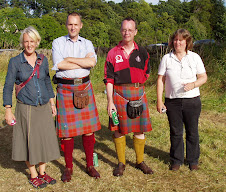The
knitting belt arrived, and I got started. This is going to be tough.
I cast on
“Rams & Yowes”. Observing my hands in the evening, when I had reverted to
the Milano and was letting them do things their own way, I discover that my
right hand does all the work. The left hand serves only to hold the left needle
steady.
I insert
the right-hand needle in the stitch from below, with the needle coming out
behind the left-hand needle. Then I let go, and wrap the yarn around the
needle. Then I take hold again and wiggle the needle to the front of the
left-hand needle, and then out of the old stitch. That’s the toughest thing for
a learner to master – getting the old stitch off the needle while leaving the
new one in place.
Everybody
must knit more or less like that. I was observing myself with special care.
With the
knitting belt, the role of the right hand is reduced to tensioning the yarn and
wrapping it around the needle. The left hand must then lift the stitch up and
off. Stephanie P-McF in that video I mentioned says that the combination is
very like the action of a sewing machine.
Well, my
hands don’t like doing it, especially does the left hand not enjoy being asked
to contribute.
I mean to
press on. Today I will reach the first two-colour round and it will be
interesting to see what happens. Will my way of holding one colour in each hand
work at all? Or will I have to learn to do it the way we saw demonstrated on
Shetland, with both colours in the right hand? Somewhere I’ve got one of those
finger-stall things for keeping colours separate. I’ve used it with moderate
success on the rare occasions I’ve attempted Scandinavian knitting of one sort
or another, and needed three colours in the same row.
Knitting
around with only three needles didn’t work very well – things felt very tight.
So I’ve added a fourth in order not to burden myself with too much learning at
once.
Meanwhile,
the Milano progresses. I wound one more skein, and will have to do another
before the next session. I think I will become increasingly fond of it as it comes to provide a refuge from my attempts to learn a new skill. The yarn is lovely on
the hands, too – merino with a dash of cashmere – whereas Shetland Supreme is
firm and tough.
Non-knit
Archie is
coming for the night. It will be good to see him. He was here while I was away,
but I missed his visit entirely. I wonder if he has secured a place on the voters’
roll, looking forward to the Referendum.



It's so hard to change life-long habits itsn't it? I've been trying to train myself to purl continental style for Double Knitting. I know what I'm supposed to be doing and can do it perfectly well, if slowly, but the tension of the finished knitting is so uneven I usually end up pulling it out and reverting to my old technique. Lucy Neatby says it's just a matter of muscle memory but I don't want to ruin my knitting in the process of learning.
ReplyDeleteWatching Norwegian slow TV (yesterday's post) must be a bit like watching the "test card" of yesteryears!
Has anyone tried Portuguese knitting? I converted (with no trouble at all, by the way -- quite the miracle, in my opinion) about a year ago, and I love it! Both hands hold the work, my left thumb (vastly unused in my lifetime) flicks the yarn, and on I go. Andrea Wong has a very clear how-to on youtube. I don't think I'd change back at this point -- and I was knitting the way I knit for 55 years before the shift!
ReplyDelete